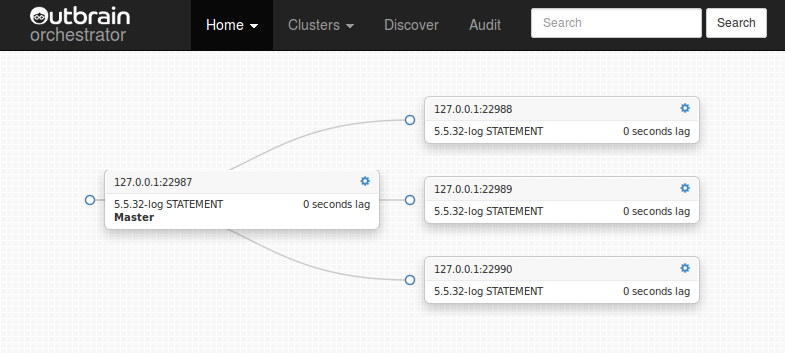NOTE: orchestrator development is now active on https://github.com/github/orchestrator, where Issues and Pull Requests are accepted.
This repository is no longer the upstream and latest version of orchestrator.
The documentation in this repository is not up-to-date.
orchestrator [Manual]
Orchestrator is a MySQL replication topology management and visualization tool, allowing for:
orchestrator actively crawls through your topologies and maps them. It reads basic MySQL info such as replication status and configuration.
It provides with slick visualization of your topologies, including replication problems, even in the face of failures.
orchestrator understands replication rules. It knows about binlog file:position, GTID, Pseudo GTID, Binlog Servers.
Refactoring replication topologies can be a matter of drag & drop a replica under another master. Moving slaves around becomes safe: orchestrator will reject an illegal refactoring attempt.
Find grained control is achieved by various command line options.
Orchestrator uses a holistic approach to detect master and intermediate master failures. Based on information gained from the topology itself, it recognizes a variety of failure scenarios.
Configurable, it may choose to perform automated recovery (or allow the user to choose type of manual recovery). Intermediate master recovery achieved internally to orchestrator. Master failover supported by pre/post failure hooks.
Recovery process utilizes orchestrator's understanding of the topology and of its ability to perform refactoring. It is based on state as opposed to configuration: orchestrator picks the best recovery method by investigating/evaluating the topology at the time of recovery itself.
Orchestrator supports:
- Command line interface (love your debug messages, take control of automated scripting)
- Web API (HTTP GET access)
- Web interface, a slick one.
- Auditing
- Supports Pseudo-GTID
- Datacenter/physical location awareness
- Maintenenace/downtime server states
- MySQL-Pool association
- Run as a service; orchestrator multi-service HA
- HTTP security/authentication methods
- When working with orchestrator-agent, seed new/corrupt instances
- More...
Read the Orchestrator Manual for comprehensive documentation.
Authored by Shlomi Noach at GitHub. Previously at Booking.com and Outbrain
